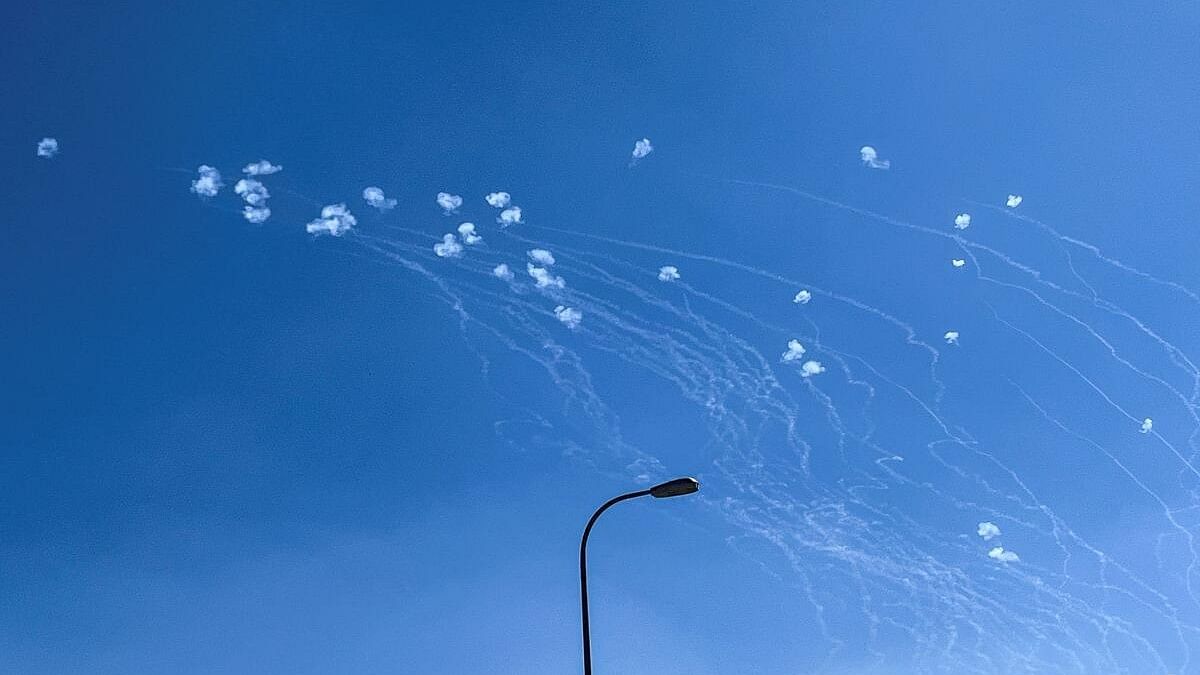
Israel's Iron Dome anti-missile defense system intercepts rockets fired from Lebanon, amid cross-border hostilities between Hezbollah and Israel, as seen from northern Israel, September 25, 2024.
Credit: Reuters Photo
Tel Aviv: The Israeli military said Wednesday that it had shot down a Hezbollah missile fired at Tel Aviv, the first time the Iran-backed militia had taken direct aim at the city, in a reminder that even after a string of Israeli attacks that have killed some of the group's commanders, Hezbollah can still reach deep into the country.
The missile, which Hezbollah said had targeted the headquarters of Israel's intelligence agency, the Mossad, caused no damage or injuries in Tel Aviv, the heart of Israel's densely populated urban core. It's not clear what Hezbollah's capabilities still are, but it was a disquieting milestone after a week of rapidly escalating conflict.
Israel's attacks continued Wednesday, with the military saying it struck about 280 sites by midafternoon. At least 51 people were killed and 223 wounded in airstrikes since Wednesday morning, Dr. Firass Abiad, the Lebanese health minister, told reporters in an afternoon news conference. He did not break down the casualties between civilians and fighters.
Hezbollah fired dozens of rockets at northern Israel, although Israeli missile defense intercepted many of them. One rocket struck a private home in Kibbutz Sa'ar, outside the city of Nahariya, spraying shrapnel that injured two men, one of them seriously, rescue workers said.
The Israeli military killed Ibrahim Mohammed Qobeisi, a senior commander who oversaw Hezbollah's missile apparatus, in an airstrike Tuesday, the latest blow in what appears to be a concerted Israeli attempt to take out the group's leadership.
One of the big questions after a week of Israeli attacks is how badly Hezbollah has been damaged by such strikes, how much of its extensive missile arsenal has been destroyed and what capabilities it still has to mount major strikes on Israel. It was unclear whether the attempted strike in Tel Aviv was a defiant warning to Israel that it could launch a bigger attack -- or a sign of the limits of its capabilities.
Israel's strikes have spread panic and desperation across Lebanon and displaced about 500,000 people, according to Lebanon's Foreign Ministry. Civilians have clogged the main roads leading to Beirut, while some from the capital have sought safety in the mountains and farther north. The U.N. refugee agency said thousands had fled from Lebanon to Syria in recent days, in a reversal of the decade-long flow of refugees in the opposite direction.
Here's what else to know:
Israel at the UN:
Prime Minister Benjamin Netanyahu of Israel is expected to travel to New York on Thursday for the U.N. General Assembly, where the conflicts in Lebanon and the Gaza Strip have been high on the agenda. Earlier this week, President Joe Biden called for a cease-fire in Gaza, and U.N. Secretary-General António Guterres warned: "The world cannot afford Lebanon to become another Gaza."
Intense air raids: In recent days, Israel has unleashed on Lebanon some of the heaviest aerial attacks in the history of modern warfare, outpacing the bombardment of Gaza during the opening days of the Israel-Hamas war in October, war experts said. Strikes on Monday alone killed more than 550 people and injured another 1,800, one of the highest daily death tolls of any recent global war, and Lebanon's deadliest day since its 15-year civil war ended in 1990.
Israel's strategy:
Israel has achieved many of its short-term goals against Hezbollah during the last week, according to current and former senior Israeli officials. But they also said there was no clear further strategy to bring calm to northern Israel, from which tens of thousands of people have fled their homes in the months of cross-border attacks by Hezbollah.
Focus on Gaza:
The families of Israeli hostages in Gaza fear their loved ones will be forgotten as Israel's attention and military resources turn to the escalating conflict in the north. Dozens of the roughly 250 hostages taken by Hamas in its October 7 attacks remain captive in Gaza. Israeli authorities have declared that more than 30 hostages are presumed dead in Gaza.